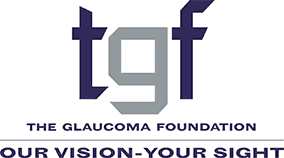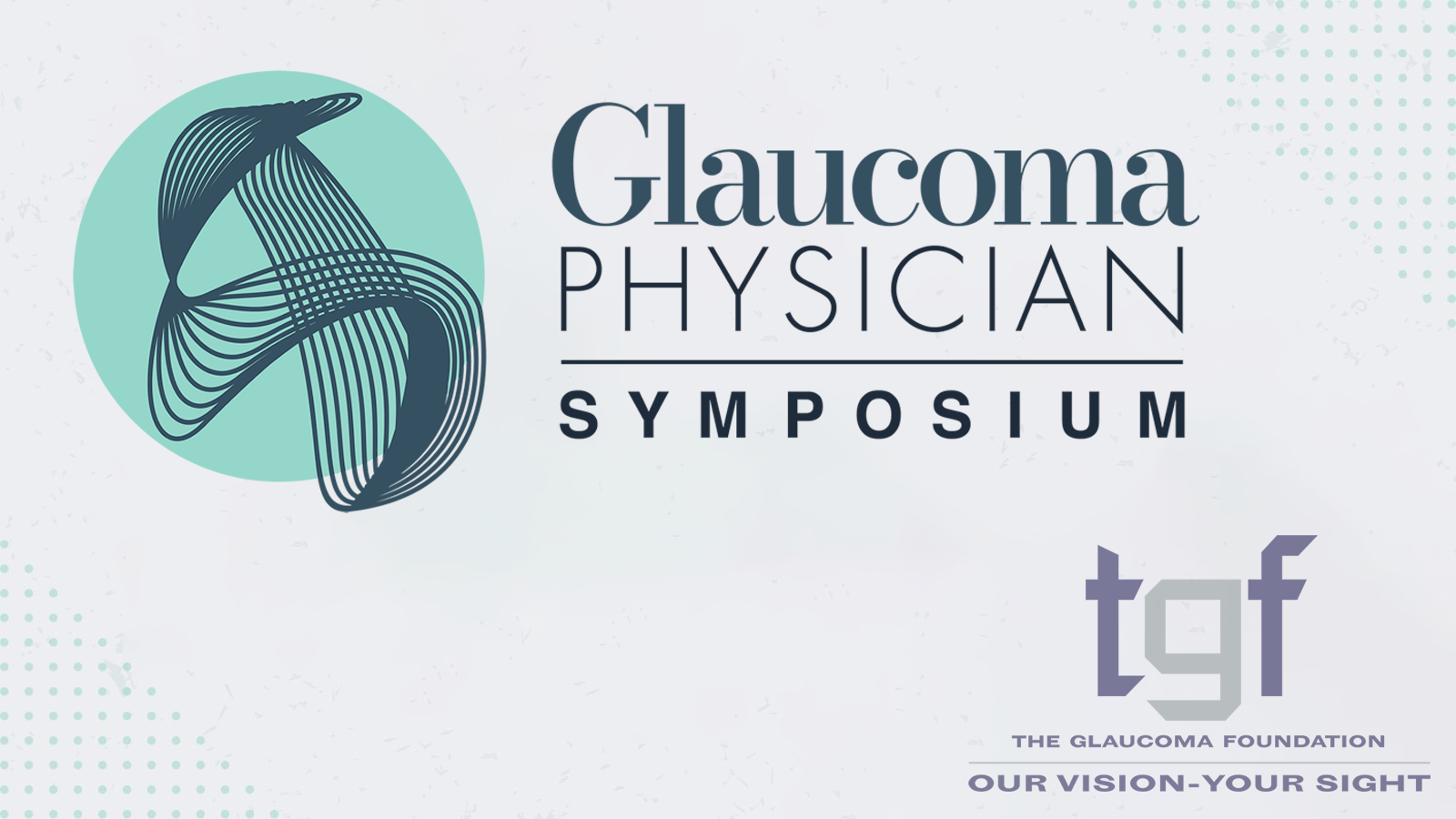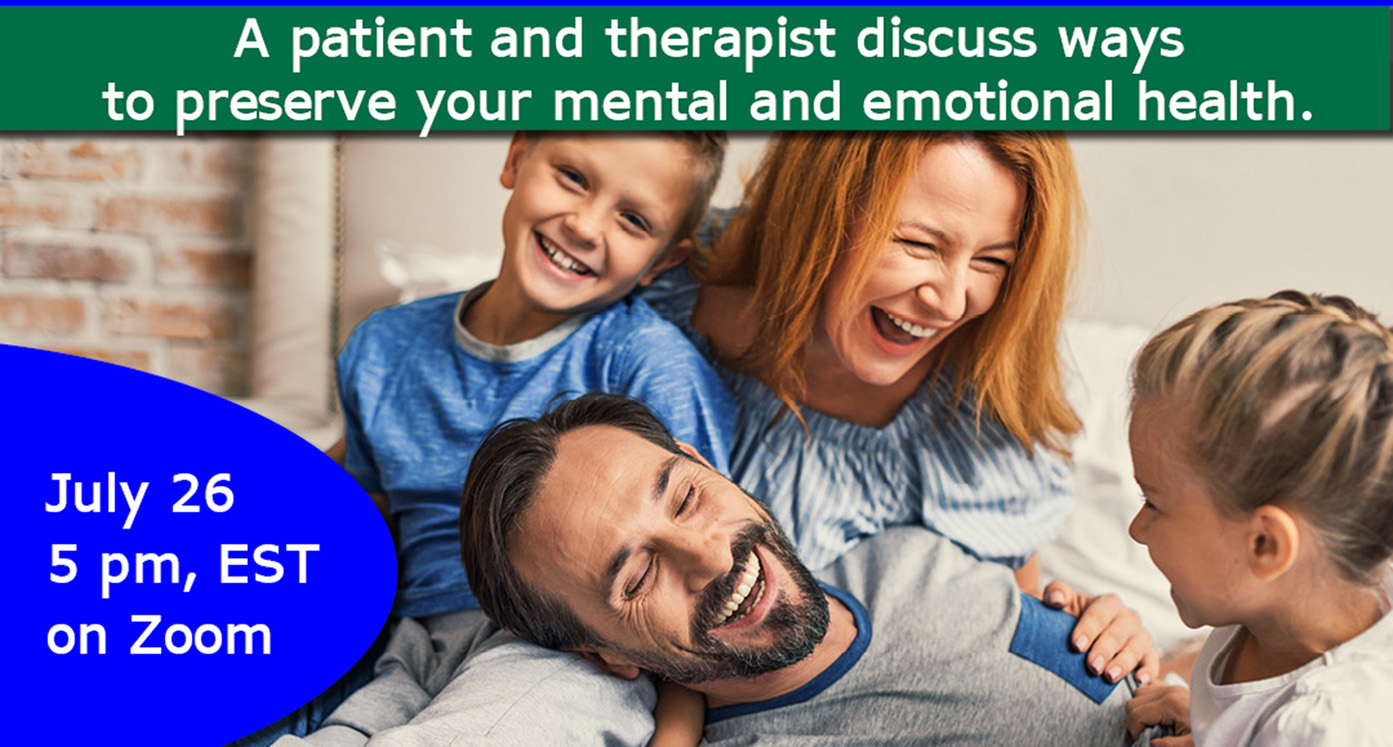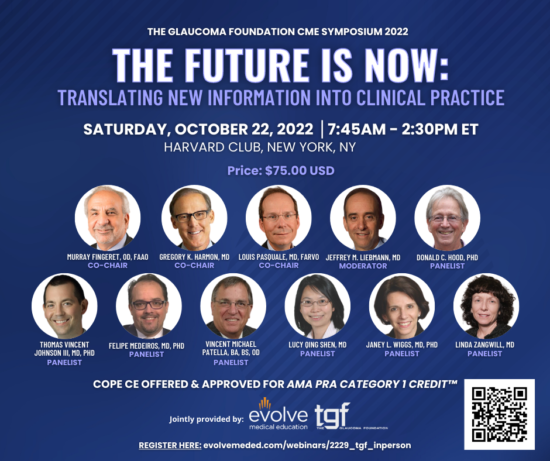Check here to see our upcoming events and videos from past events.
TGF & Glaucoma Physician Symposium Partnership
The Glaucoma Foundation is pleased to announce our partnership with the Glaucoma Physician Symposium being held on August 6. The Glaucoma Physician Symposium is a 1-day meeting focused on the latest discussion topics and questions surrounding glaucoma diagnosis and treatment. This CME-accredited, digital conference features live panel discussions throughout six sessions, led by the top glaucoma experts from around the country. Be sure to visit TGF’s virtual information booth when you attend.
"Navigating the Psycho/Social Aspects of Glaucoma"
The psycho-social issues of glaucoma that so dramatically affect a patient’s quality of life are rarely addressed in glaucoma care as they have been in other medical situations such as AIDS, cancers and Alzheimers.How can glaucoma affect your professional and personal life? How does stress impact glaucoma? What techniques can reduce anxiety? What should you look for in a therapist? Glaucoma patient Joe Lovett and psychologist Deborah Waxenberg explore these and other questions about living with glaucoma.
"The Future is Now: Translating New Information into Clinical Practice"
Join us for The Glaucoma Foundation CE Symposium 2022!
COPE CE Offered & Approved for AMA PRA Category 1 Credit™
Panel Discussions | Breakfast and Lunch
Agenda:
7:45am Breakfast
8:15am Welcome: Greg Harmon, Elena Sturman
8:20am-9:50am Session 1 – Structure/Function: Murray Fingeret, OD, FAAO Moderator – 90 minutes
Diagnosing Glaucoma with the OCT Alone: Don C. Hood, PhD, – 30 minutes
Clinical Advantages to 3D Reconstruction of the Optic Nerve Head and Peripapillary Tissue: Lucy Qing Shen, MD – 20 minutes
VR Perimetry – Is this the Future of Perimetry?: Mike Patella, BA, BS, OD – 20 minutes
Panel Discussion – 20 minutes
- Can an objective definition of glaucoma be widely accepted not only for research purposes but also clinical care?
- How early does glaucoma need to be diagnosed from a cost-benefit standpoint?
- Should the use of perimetry be limited to those cases in which OCT results are inconclusive?
9:50am-10:10am Break
10:10am-11:40am Session 2 – Artificial Intelligence and Glaucoma: Jeffrey M. Liebmann, MD, Moderator – 90 minutes
An Overview: Felipe Medeiros, MD, PhD – 30minutes
Clinical Applicability of AI: Linda Zangwill, MD – 30 minutes
Case Presentation and Panel Discussion – 30 minutes
- What are the main barriers that hinder AI from being ready for clinical in glaucoma management use in 2022-2023?
- How to enable data sharing across clinical centers and industry to accelerate AI development?
11:40am-12:00pm Break
12:00pm-1:30pm Session 3 – Hot Topics 90 Minutes: Louis Pasquale, MD, FARVO, Moderator
Applying Genetics in Your Practice: Janey L. Wiggs, MD, PhD – 30 minutes
Restoring Vision in Glaucoma Patients – Optic Nerve Transplantation: Thomas Johnson III, MD, PHD – 30 minutes
Case Presentation and Panel Discussion – 30 minutes
- When should clinicians refer patients for genetic testing for diseases with a Mendelian inheritance (eg.: MYOC)? What to do if the test comes positive for the most common mutations?
- How to balance the potential for vision recovery in glaucoma and the need to manage risk factors that may continue to threaten vision even after those new therapies are performed?
1:30pm-2:30pm Lunch
"Harnessing Artificial Intelligence to Improve Glaucoma Management: Challenges & Opportunities"
How will artificial intelligence improve glaucoma care?
How can AI support clinicians in the treatment of their glaucoma patients?
What are the challenges in implementing appropriate AI systems in clinical practice?
This webinar will provide basic information about artificial intelligence (AI) in ophthalmology, and an overview of the latest developments in the use of AI to automate and improve the management of glaucoma.
Dr. Zangwill’s presentation will highlight the opportunities for providing real-time AI decision support to clinicians treating glaucoma patients, as well as the challenges in implementing appropriate AI systems in clinical practice.
Linda Zangwill, Ph.D., Professor of Ophthalmology at the University of California San Diego serves as Director of Clinical Research of the Hamilton Glaucoma Center, and Director of the Imaging Data Evaluation and Analysis Reading Center. Dr. Zangwill has published over 350 manuscripts in peer-reviewed journals. She is an elected executive committee member of the Glaucoma Research Society and is an Association for Research in Vision and Ophthalmology Gold Fellow.
Dr. Zangwill has been continuously funded by the National Eye Institute for 25 years as Principal Investigator for the Diagnostic Innovations in Glaucoma Study (DIGS) and more recently, the African Descent and Glaucoma Evaluation Study (ADAGES). Dr. Zangwill’s clinical research focuses on improving our understanding of the complex relationship between structural and functional change over time in the aging and glaucoma eye, developing computational and machine learning techniques to improve glaucoma detection, developing methods to differentiate between highly myopic eyes with and without glaucoma, and identifying risk factors that can predict rapidly progressing glaucoma.
"Glaucoma: Seeing the Light at the End of the (Nano)Tunnel"
At the lab of Dr. Adriana Di Polo at University of Montreal, researchers are paving the way for the development of therapeutic approaches to protect pericytes and their nanotubes. The goal? Restoring vascular health and vision in glaucoma.
In living animals, as in humans, the retina uses the oxygen and nutrients contained in the blood to function properly. This vital exchange takes place through capillaries, the thinnest blood vessels in all organs of the body. Pericytes are small cells that wrap around capillaries. A pericyte can control the amount of blood passing through a single capillary simply by squeezing and releasing it.
In this webinar from April 4, Dr. Di Polo presented new findings from her laboratory demonstrating the critical role that pericytes play in vascular dysfunction in glaucoma. A key discovery is that inter-pericyte tunnelling nanotubes, thin nanotubes by which pericytes communicate with each other, are damaged in glaucomatous eyes contributing to the death of retinal neurons. Strategies that restore calcium equilibrium in pericytes are effective to rescue vascular function and promote neuroprotection. This work paves the way for the development of therapeutic approaches to protect pericytes and their nanotubes with the goal of restoring vascular health and vision in glaucoma.
Using Artificial Intelligence to Disentangle Glaucoma Pathogenesis
This video is from our March 15th Zoom where Dr. Louis Pasquale discussed how artificial intelligence will impact glaucoma prevention and treatment.
Primary open-angle glaucoma (POAG) is a disease subtype defined by chronic, progressive, and irreversible retinal ganglion cell (RGC) loss without clinically evident causes for either elevated intraocular pressure (IOP) or optic nerve degeneration. Globally, there are currently 53 million POAG cases, with projections of 80 million cases by 2040. These staggering statistics are a clarion call to find cost-effective strategies for glaucoma prevention and treatment. This talk will provide an overview regarding our approach to leverage artificial intelligence in large cohorts containing a wealth of biomarker and environment data to meet these challenges and reduce ocular morbidity due to glaucoma.
Louis R. Pasquale, MD is is the Shelley and Steven Einhorn Distinguished Professor of Ophthalmology and Site Chair of the Department of Ophthalmology at Mount Sinai Hospital. He is Vice Chair of Translational Ophthalmology Research at Mount Sinai Healthcare System.
Dr. Pasquale is a member of the PLOS One, Journal of Glaucoma, Ophthalmology Glaucoma, Asia-Pacific Journal of Ophthalmology, and American Journal of Ophthalmology editorial boards. He currently serves as Glaucoma Trustee for ARVO and is a member of the National Institute of Health’s National Advisory Eye Council.
An NIH Principal Investigator with continuous support since 2006, his research leverages the rich resources available in the Nurses Health Study, Health Professional Follow-up Study and the Women’s Genome Health Study, and focuses on the discovery of primary prevention strategies in the open-angle glaucomas.
Physicians and scientists on the faculty of the Icahn School of Medicine at Mount Sinai often interact with pharmaceutical, device and biotechnology companies to improve patient care, develop new therapies, and achieve scientific breakthroughs.
NEW HORIZONS IN GLAUCOMA TREATMENT
Dr. Jeffrey Liebmann joined us on Zoom to talk about the latest news in glaucoma procedures and treatments and answer viewer questions. This webinar was sponsored by Santen Pharmaceuticals.
Dr. Jeffrey M. Liebmann graduated from Boston University School of Medicine, completed his ophthalmology residency at the State University of New York/Downstate Medical Center, and his glaucoma fellowship at the New York Eye and Ear Infirmary. Dr. Liebmann serves as Shirlee and Bernard Brown Professor, Vice-Chair, and Director of the Glaucoma Division of the Department Ophthalmology at Columbia University Medical Center. He is a fellow of the American Academy of Ophthalmology, Association for Research in Vision and Ophthalmology and American College of Surgeons. Dr. Liebmann serves as a member of the Board of Governors of the World Glaucoma Association, Board of Directors of The Glaucoma Foundation and Secretary-Treasurer of the New York Glaucoma Society. Dr. Liebmann is a past-President of the World Glaucoma Association, American Glaucoma Society, and the New York Society for Clinical Ophthalmology, Emeritus Editor-in Chief of Journal of Glaucoma and was co-founder of the New York Glaucoma Research Institute, the American Glaucoma Society Foundation and ASCRS Glaucoma Day.
In addition to maintaining a busy tertiary-care referral practice in New York City, Dr. Liebmann is Principal Investigator for the NIH African Descent and Glaucoma Evaluation Study (ADAGES) and Ocular Hypertension Treatment Study (OHTS III) at Columbia University and is the author and/or co-author of more than 1000 medical and scientific papers, book chapters, and abstracts. He has lectured widely in the United States and abroad on glaucoma diagnosis and management. His current main areas of research interest include the causes of glaucoma, glaucoma progression, glaucoma surgery, ocular imaging, and neuroprotection.
A Fireside Chat
With Dr. George Spaeth & Mark Lesselroth
The Glaucoma Foundation invites you to a fireside video chat with Mark Lesselroth and Dr. George Spaeth who delve into some of the common misconceptions about glaucoma and how patients can take control of their health.
We will be following up on this conversation with a written Q&A in the September issue of our e- newsletter.
We hope you find this discussion informative and thought-provoking. If you have a comment or question, please send it to us by email by August 30. We look forward to hearing from you.
Low-Tech : High Tech
Low Vision Solutions 101
We had a panel of low-vision specialists and patient advocates talk about a range of techniques and assets you can use to improve your home and work-life. From simple low-tech methods and products to advanced optical and electronic technologies.
Bringing the Latest Glaucoma Science Directly to the Patient
TGF held a webinar with four brief, illuminating talks by experts on gene therapy, optic nerve regeneration, the role of artificial intelligence, and the importance of trust between physician and patient. We also had perspectives from two patients. Presented in two parts with Q&As. The webinar was made possible with support from Santen, Inc. and New York Community Trust.
Update on Home Tonometry: An Easy Way to Track Your IOP
Click the video below to see our webinar about “MyEYES.” MyEYES is dedicated to helping you better manage your glaucoma with access to the personal tonometer, iCare HOME.
iCare HOME is the most advanced device available for a patient to measure their intra-ocular pressure (IOP) any time of day or night. Whether you suffer from mild or severe glaucoma or are only a glaucoma suspect, MyEYES can help you learn more about the variability of your IOP in the convenience of your home. Managing IOP is a critical step in avoiding preventable deterioration of your vision and the iCare HOME is the next step in managing your eye health.
An Overview of Low Vision Rehabilitation with Delaram Shirazian, OD
Click below to see our webinar with Dr. Delaram Shirazian about low vision rehabilitation. We discuss low vision rehabilitation, what to expect during a low vision exam, how it differs from a regular eye exam, low vision devices and updates in technology.
Dr. Delaram Shirazian earned her Doctor of Optometry degree from the University of Missouri – St. Louis and went on to complete a residency in Ocular Disease and Low Vision Rehabilitation at the Kansas City VA Medical Center.
Dr. Shirazian is currently an Assistant Clinical Professor at SUNY College of Optometry, working with patients and students in primary care and low vision rehabilitation clinics. She also teaches the patient-doctor communication portion of the first-year curriculum and is the instructor of record of the Low Vision/Ocular Disease Micro-Credential program. Dr. Shirazian is a fellow of the American Academy of Optometry.
You can find additional low vision resources in our Patient Resource Center.
"Going Blind" Movie Panel Discussion
Click below to view a Q&A panel with our President & CEO Elena Sturman, activist and documentary filmmaker Joe Lovett (Director & Producer of “Going Blind”), Jessica Jones (Art Teacher, The Lavelle School for the Blind), Joel Schuman, MD, FACS (Professor and Chairman of Ophthalmology, NYU Langone Health), Delaram Shirazian, OD (Assistant Clinical Professor, SUNY College of Optometry) and Nitza Daneli (Artist & Director of The Alfano Family Arts in Medicine Studio). To view the film go to https://goingblindmovie.com/.



